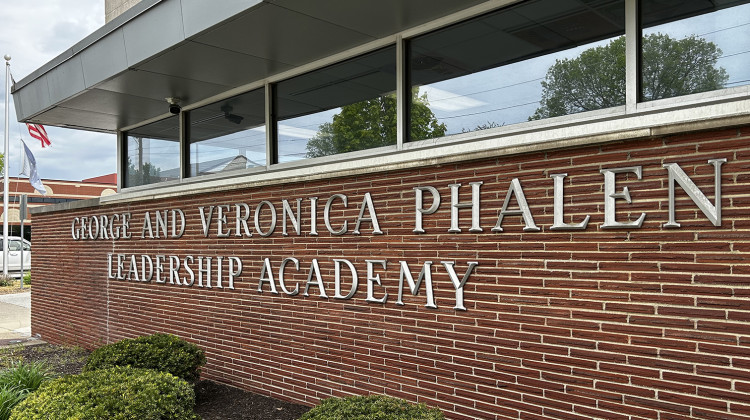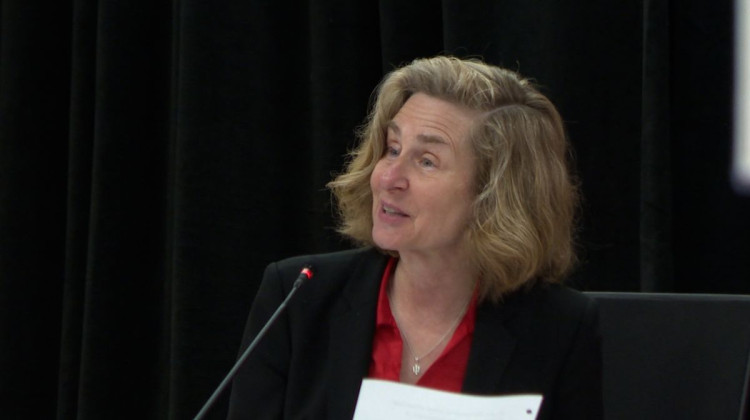
Charter schools part of the Phalen Leadership Academies network in Marion and Lake counties will begin receiving local property-tax funds in 2025 under a new Indiana law.
Eric Weddle / WFYIIndiana charter schools will gain access to local property tax money next year — a sea change in school funding that comes after years of lobbying by advocates.
Charter schools, which are tuition free public schools and privately managed by a non-elected board, have largely missed out on the property tax revenue that public school districts receive. Instead, they rely on state, federal and philanthropic money. Now, new laws give them a cut of local taxes, including some of the property taxes all school systems collect and additional money schools get when voters approve referendums.
The laws are limited: They target just four counties and only apply to new revenue. But supporters and critics alike say they mark dramatic policy change.
“It is a monumental shift in philosophy,” said Joel Hand, a lobbyist for the Indiana Coalition for Public Education, which supports traditional public school districts.
Hand believes the laws open the door for charter schools to get more property tax money in the future. He compared the new policy to private school vouchers, which were only available to a small group of children from low-income families when they were created more than a decade ago. Legislation just signed into law by Gov. Eric Holcomb makes vouchers near universal.
Hand said the state should not direct property taxes to charter schools.
“With traditional public schools, they are accountable to the local taxpayers through publicly elected — in almost all cases — a publicly elected board,” Hand said. “It's very concerning that we're making this shift where taxpayers don't have that same level of transparency and accountability.”
About 29,000 Indiana students currently attend brick-and-mortar charter schools, which were first created in 2001. Because charter schools do not receive local tax money, the state provides additional grant funding. That has steadily increased in recent years, and it will be $1,400 next school year.
The amount of local property taxes a traditional school district receives per student varies across the state, but it can range from less than $100 to more than $1,000 depending on the value of local property.
There are 131 charter schools around the state, including in rural and suburban areas. But many of those schools are in the state’s urban centers and the students they serve are disproportionately likely to be children of color and students from low-income families.
“This just provides a little more fairness in order to ensure that all public school children have some operations funding,” said Sen. Linda Rogers (R-Granger), who authored the bill requiring districts to share referendum revenue.
“If you have a student going to a charter school, that additional funding will help with the expenses of the school — with utilities, and if they don't have bus service, eventually, that may be something that they can provide," Rogers said.
Only districts in Marion, Lake, St. Joseph and Vanderburgh counties, however, will be required to share property tax money with charter schools under the new laws. Rogers said those counties were chosen because they contain a large share of the state’s charter school students.
Allen County, which has the same charter school student enrollment as Vanderburgh County, was not included in the new laws.
In communities affected by the bill, the state budget gives charter schools a slice of new property tax funding, and for the most part, districts won’t be forced to give up money they were already receiving. Instead, they must share new revenue from rising property values. The amount schools receive will be based on the number of local students who attend.
School corporations in the four counties will lose about $9 million in 2025 and nearly $13 million in 2026 because that money will be redirected to charter schools, according to an estimate from the nonpartisan Legislative Services Agency.
Rogers said lawmakers chose to narrow the bill to new revenue so that districts don’t “incur a huge loss” as a result of sharing money.
Senate Bill 391 has a similar provision that gives charter schools a share of the money districts get from referendums. In order to benefit from referendums, charter schools must contribute to the cost of conducting the referendum.
Betsy Wiley, leads the Institute for Quality Education, an advocacy group that supports charter schools. Wiley described the changes as “extremely important” first steps toward getting charter schools more funding.
"Long term, if you have a more equal playing field, you may see greater growth and expansion in the charter environment, throughout the state,” Wiley said, “which is, in my opinion, a great thing."
Virtual charter schools and charter schools for adults are not eligible for local property taxes under the new laws.
Contact WFYI education reporter Dylan Peers McCoy at dmccoy@wfyi.org. Follow on Twitter: @dylanpmccoy.
 DONATE
DONATE






 Support WFYI. We can't do it without you.
Support WFYI. We can't do it without you.